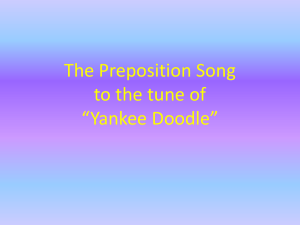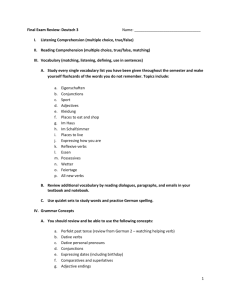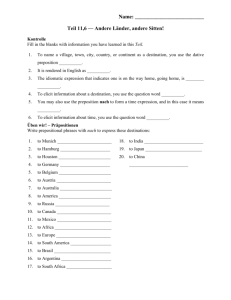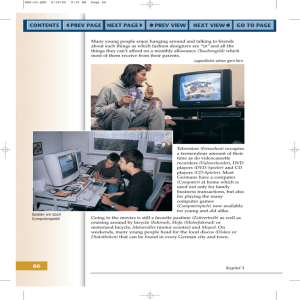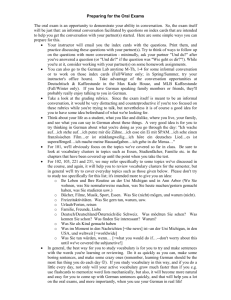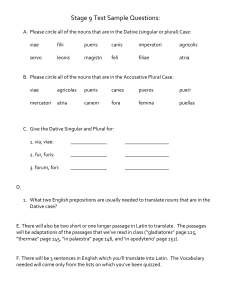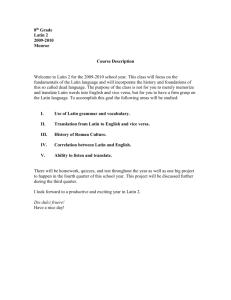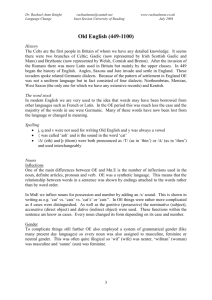Review of the Einführung
advertisement
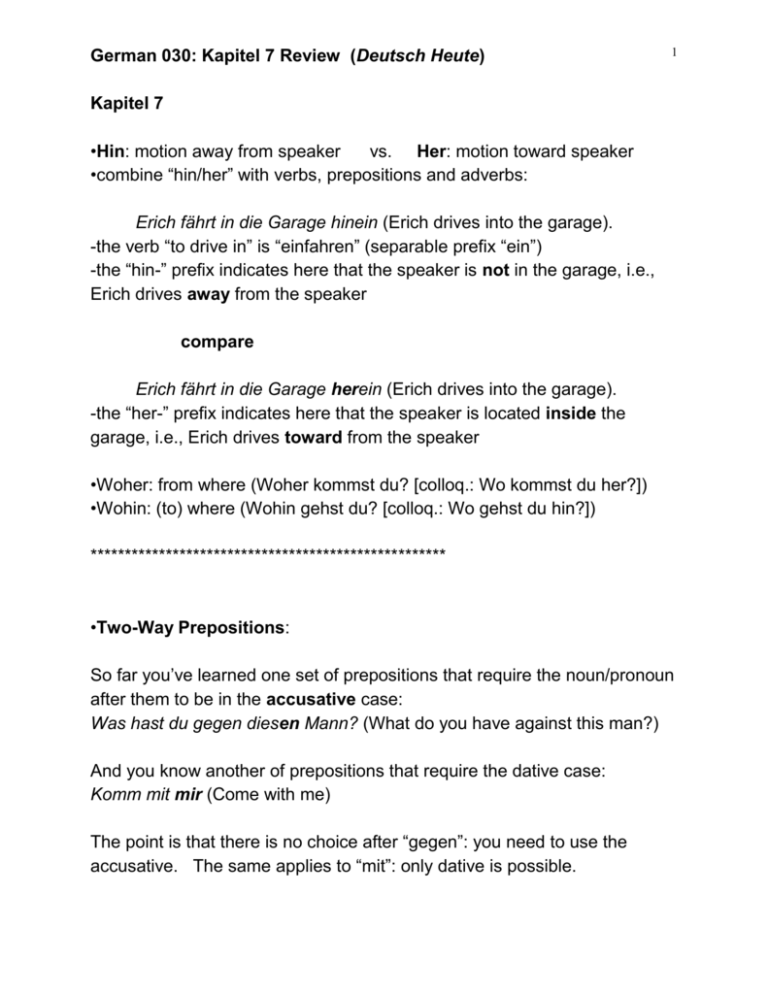
German 030: Kapitel 7 Review (Deutsch Heute) 1 Kapitel 7 •Hin: motion away from speaker vs. Her: motion toward speaker •combine “hin/her” with verbs, prepositions and adverbs: Erich fährt in die Garage hinein (Erich drives into the garage). -the verb “to drive in” is “einfahren” (separable prefix “ein”) -the “hin-” prefix indicates here that the speaker is not in the garage, i.e., Erich drives away from the speaker compare Erich fährt in die Garage herein (Erich drives into the garage). -the “her-” prefix indicates here that the speaker is located inside the garage, i.e., Erich drives toward from the speaker •Woher: from where (Woher kommst du? [colloq.: Wo kommst du her?]) •Wohin: (to) where (Wohin gehst du? [colloq.: Wo gehst du hin?]) **************************************************** •Two-Way Prepositions: So far you’ve learned one set of prepositions that require the noun/pronoun after them to be in the accusative case: Was hast du gegen diesen Mann? (What do you have against this man?) And you know another of prepositions that require the dative case: Komm mit mir (Come with me) The point is that there is no choice after “gegen”: you need to use the accusative. The same applies to “mit”: only dative is possible. German 030: Kapitel 7 Review (Deutsch Heute) 2 Now we learn a third set of prepositions known as TWO-WAY prepositions. These prepositions require either the dative or the accusative, and you have to do some thinking before you choose. Let’s take the above example with Erich the driver: Erich fährt in die Garage hinein/herein. •”in” is a two-way preposition which means that the noun/pronoun after it might be in the accusative or in the dative case (don’t panic!!!) -to determine the case, you need to ask if the sentence answers the question “wohin?” or “wo?” -if there is movement toward a destination involved, the question is “wohin?” (this applies to the example with Erich) -if,however, there is no movement toward a destination or the location of something is being given, the question is going to be “wo?”, e.g., Erich ist in der Garage (Erich is in the garage). -thus, the answer to a “wohin” question will require the accusative case for the noun/pronoun following a two-way preposition (Erich fährt in DIE Garage), while the answer to a “wo” question will require the dative for the noun/pronoun following a two-way preposition (Erich ist in DER Garage) ********************************************************************************** •Verb of positioning (legen/liegen, stellen/stehen, setzen/sitzen, stecken/stecken, hängen/hängen): -the verb form to the left of the slash takes an object: we put something into a certain position, e.g., Ich lege das Buch auf den Tisch (I am putting the book on the table) -the verb to the right of the slash indicates the position of the subject, e.g., Das Buch liegt auf dem Tisch (The book is on the table) - legen/liegen is applied to the position of people and things that are more or less flat against a horizontal surface (see "book" example above) German 030: Kapitel 7 Review (Deutsch Heute) 3 - stellen/stehen is applied to the position of people or things that are not flat against a horizontal surface but rather vertical (or upright), e.g., Ein Mann / Ein Auto steht vor dem Haus (A man / a car is in front of the house) setzen/sitzen: -the verb “setzen” means “to put (someone/something) into a sitting position" and can apply only to people, dolls or animals, e.g., Ich setze das Kind vor den Tisch (I am putting the child in front of the table) -the verb “sitzen” means "to be in a sitting position," e.g., Das Kind sitzt vor dem Tisch (The child is sitting in front of the table) -stecken/stecken: applied to positioning in a confined space (insertion), e.g, Ich stecke das Geld in die Tasche (I am putting the money in the pocket) -note that when it comes to verbs of positioning (except for "hängen" and "stecken"), •the ones that take a dir. object are weak in the past tense (Ich habe die Katze auf das Bett gesetzt (I put the cat on the bed); •the ones that take no object are strong in the past tense (Ich habe am Tisch gesessen [I was sitting at the table]) •Verbs of positioning answer the questions "wohin" or "wo" Die Lampe steht auf dem Boden [note dative] (The lamp is [standing] on the floor) WO? vs. Ich stelle die Lampe auf den Boden [note accusative] (I am putting the lamp on the floor) WOHIN? -English is not precise with positioning and resorts to “is” and “put” -German is picky and therefore specifies if objects are standing, lying, located in confined spaces etc. (and the same goes for “putting”) German 030: Kapitel 7 Review (Deutsch Heute) ************************************************************* •An: a preposition that can mean “ON” with respect to vertical surfaces Das Bild hängt an der Wand (The picture hangs on the wall) [WO = dative (this is location)] Ich hänge das Bild an die Wand (I am hanging the picture on the wall) [WOHIN = accusative (this is destination since the picture is moved through space to get to the wall)] The preposition an can also mean “at”, “by”, “near” or “to” Der Stuhl steht an dem [am] Fenster (The chair is at/by the window) [WO = dative (location)] Ich stelle den Stuhl an das [ans] Fenster (I’m putting the chair at/by the window) [WOHIN = accusative (destination)] N.B. Here the key issue is that something is next to but not on top of something else (which is the opposite of AUF) •Auf: a preposition the can mean “ON” with respect to horizontal surfaces Die Zeitung liegt auf dem Tisch [note dative] (The paper is [lying] on the table) WO = dative vs. Ich lege die Zeitung auf den Tisch [note accusative] (I am putting [laying] the paper on the table) WOHIN = accusative N.B. Here the key issue is that something is on top of something else N.B. “über” is two-way, but not when it means “about” (accus.) **************************************************************** Time expressions with the DATIVE 4 German 030: Kapitel 7 Review (Deutsch Heute) 5 •Time expressions referring to weekends, days and parts of days are used with am (but not “Nacht” and “Mitternacht”) •e.g., am Wochenende, am Donnerstang, am Abend (but: in der Nacht, um Mitternacht) N.B. am = an dem [dative] In is followed by the dative in time expressions: Ich fahre in einer Woche nach Deutschland (I’m going to Germany in a week) -or consider the months/seasons: im [in dem] Winder, im [in dem] Januar N.B. With months and season you can’t say “in dem,” i.e., im is required Vor is also followed by the dative in time expressions and means “ago” Vor einer Woche bin ich nach Deutschland gefahren (I week ago I went to Germany) ************************************************************************** Time expressions with the ACCUSATIVE •With the following adjectives: nächst_ , letzt_ , jed_ , vorig_, dies_ the accusative is used •e.g., jeden Tag, letzte Woche, voriges Jahr, nächsten Montag, dieses Wochenende (note: no preposition) Jeden Tag liest mein Bruder die Zeitung [not the accusative] (My brother reads the paper every day) •duration (how long something lasts) also requires the accusative case: Er hat in Österreich ein Jahr gewohnt (He lived in Austria [for] a year) N.B. Don’t be tempted to translate the English “for” in this case German 030: Kapitel 7 Review (Deutsch Heute) 6 ************************************************** Da-Compounds •Here the question is what happens when a preposition is followed by a pronoun, e.g., The money is in the pocket. -let’s replace the noun (pocket) by a pronoun (it): The money is in it. -so we have the preposition in followed by the pronoun it •In German sometimes we will translate such a pronoun and sometimes we will use a da-compound. Non-persons If you have a preposition plus a pronoun NOT referring to persons (about it, under it, etc.), you don't translate the pronoun as you go from Engl. to Germ. Instead you take da and attach it to the preposition (darüber, darunter etc.). •da + prep. beginning with vowel = dar + prep., e.g., da + auf = darauf Persons With persons you do translate the pronoun (über ihn/ gegen sie...). •I have nothing against them (persons) Ich habe nichts gegen sie (you see how we translated “them”?) compare •I have nothing against it (not a person) Ich habe nichts dagegen (we didn’t translate it because it’s not a person, but we put “da-” before the preposition) ******************************************************************* Wo-compounds In a question the rules for da-compounds apply but you use wo- instead of da- German 030: Kapitel 7 Review (Deutsch Heute) 7 In questions the pronouns are WER and WAS •About what are you talking? (What are you talking about?) “What” is not a person, so don’t translate it: Worüber sprechen Sie? -we have simply put “wo-” before the prepositin “über” •About whom are you talking? (Who are you talking about?) “Who” is a person, so translate it: Über wen sprechen Sie? ********************************************************************** a)Direct question: Was kaufst du? ( What are you buying?) Kaufst du ein Auto? (Are you buying a car?) Direct questions (as you recall) have the following word order: questions word + verb + subject (Was kaufts du?) verb + subject (Kaufst du ein Auto?) b) Indirect question: Er fragt, was sie kauft (He is asking what she is buying) c) Indirect informational question1: Er weiß nicht, was sie kauft (He doesn’t know what she is buying) Er weiß nicht, ob sie ein Auto kauft (He doesn’t know if she is buying a car) Er weiß nicht, wann sie ein Auto kauft (He doesn’t know when she is buying a car) In b and c we have a main clause (Er fragt / Er weiß nicht) + a dependent clause with the following word order: Main clause + Dept. Clause (question word / obj. + subj. +... verb [at END!]) 1 The textbook refers to this as an indirect informational question, but one could argue that this is not a question. It is rather a profession of ignorance. However, what matters here is the syntactic construction so we won’t quibble. German 030: Kapitel 7 Review (Deutsch Heute) *ob = if (whether) vs. wenn = if (condition): S. 267 top With an auxiliary verb (haben/sein) and a past participle, i.e., we are dealing with the past tense, the word order is: Ich weiß nicht, was sie für mich gekauft hat. Ich weiß nicht, ob sie für mich ein Auto gekauft hat. 8
